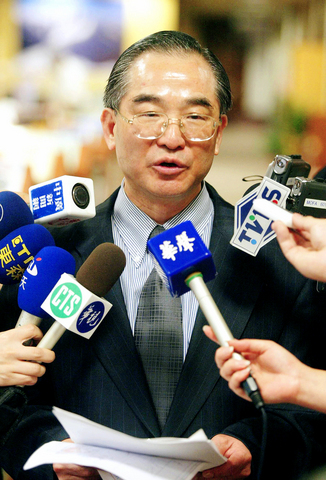The Ministry of Foreign Affairs hopes to convene a 15th round of fishery negotiations with Japan to resolve the problems incurred as a result of their overlapping exclusive economic zones, a foreign ministry official said yesterday.
Gary Lin (林松煥), director of the ministry's Department of East Asian and Pacific Affairs, made the remarks one day after nearly 50 Taiwanese fishing boats converged in waters northeast of the country to protest against Japanese patrol ships, which chased them away from the disputed area.
The fishermen initially wanted to confront the Japanese patrol boats but the protest fizzled out when no Japanese patrol boats showed up, just reconnaissance planes.

PHOTO: CNA
Lin said that before Taiwan and Japan negotiate a provisional boundary, Taiwanese fishermen should stay within the patrol line of Coast Guard Administration (CGA) patrol boats.
He said that following the protest, the ministry had lodged a protest with the Japanese authorities urging them to exercise self-restraint and asked for a 15th round of talks.
At issue is the formulation of a Japanese law in 1996 regarding its exclusive economic zone and continental shelf, which included parts of Taiwan's exclusive economic zone within its the Japan's economic zone. The two countries have conducted 14 rounds of talks on the issue since 1996.
Meanwhile, Democratic Progressive Party (DPP) legislators Wang Tuoh (王拓) and Hsu Kuo-yung (徐國勇) yesterday urged Japan to conduct talks with Taiwan as soon as possible.
Wang said that the fishermen's move shows that they can no longer tolerate "the pirate acts of the Japanese patrol boats" and that they have become desperate regarding the government's lack of resolve to protect them.
He said that he has asked the Fisheries Administration to confront the Japanese patrol boats as a way of pressuring Tokyo to come to the negotiation table.
If Japan still won't talk, Wang said, he would not rule out the possibility of mobilizing fishermen to stage a protest at the Interchange Association, Japan's representative office in Taipei.
Hsu said Japan has turned a deaf ear to Taiwan's appeal for talks for fear of China.
Hsu asked the foreign ministry, the CGA and the Fisheries Administration to form a task force to review the issue.
also see story:
Do more to protect fishermen, blue camp says

AGING: As of last month, people aged 65 or older accounted for 20.06 percent of the total population and the number of couples who got married fell by 18,685 from 2024 Taiwan has surpassed South Korea as the country least willing to have children, with an annual crude birthrate of 4.62 per 1,000 people, Ministry of the Interior data showed yesterday. The nation was previously ranked the second-lowest country in terms of total fertility rate, or the average number of children a woman has in her lifetime. However, South Korea’s fertility rate began to recover from 2023, with total fertility rate rising from 0.72 and estimated to reach 0.82 to 0.85 by last year, and the crude birthrate projected at 6.7 per 1,000 people. Japan’s crude birthrate was projected to fall below six,

US President Donald Trump in an interview with the New York Times published on Thursday said that “it’s up to” Chinese President Xi Jinping (習近平) what China does on Taiwan, but that he would be “very unhappy” with a change in the “status quo.” “He [Xi] considers it to be a part of China, and that’s up to him what he’s going to be doing, but I’ve expressed to him that I would be very unhappy if he did that, and I don’t think he’ll do that. I hope he doesn’t do that,” Trump said. Trump made the comments in the context

SELF-DEFENSE: Tokyo has accelerated its spending goal and its defense minister said the nation needs to discuss whether it should develop nuclear-powered submarines China is ramping up objections to what it sees as Japan’s desire to acquire nuclear weapons, despite Tokyo’s longstanding renunciation of such arms, deepening another fissure in the two neighbors’ increasingly tense ties. In what appears to be a concerted effort, China’s foreign and defense ministries issued statements on Thursday condemning alleged remilitarism efforts by Tokyo. The remarks came as two of the country’s top think tanks jointly issued a 29-page report framing actions by “right-wing forces” in Japan as posing a “serious threat” to world peace. While that report did not define “right-wing forces,” the Chinese Ministry of Foreign Affairs was

PREPAREDNESS: Given the difficulty of importing ammunition during wartime, the Ministry of National Defense said it would prioritize ‘coproduction’ partnerships A newly formed unit of the Marine Corps tasked with land-based security operations has recently replaced its aging, domestically produced rifles with more advanced, US-made M4A1 rifles, a source said yesterday. The unnamed source familiar with the matter said the First Security Battalion of the Marine Corps’ Air Defense and Base Guard Group has replaced its older T65K2 rifles, which have been in service since the late 1980s, with the newly received M4A1s. The source did not say exactly when the upgrade took place or how many M4A1s were issued to the battalion. The confirmation came after Chinese-language media reported